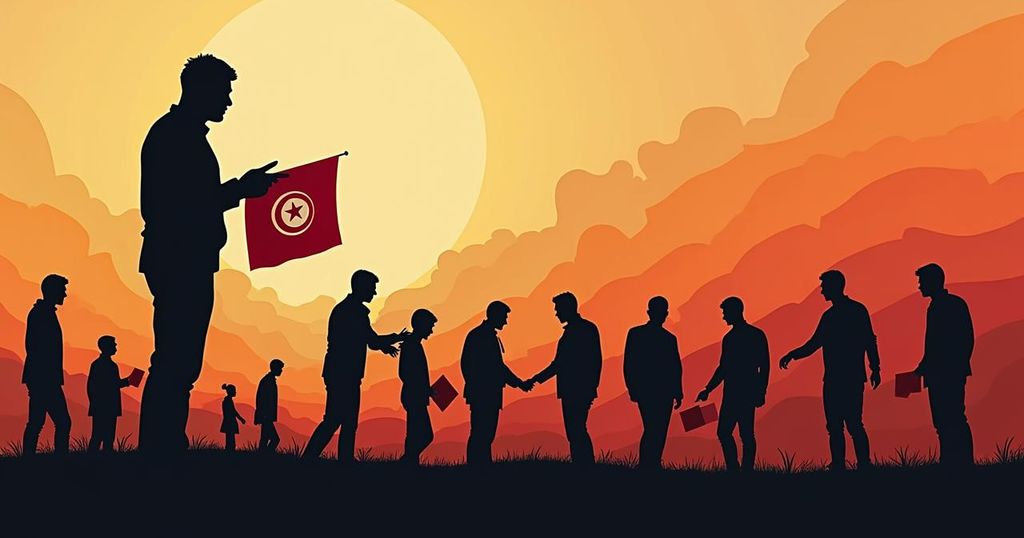Tunisia’s presidential election presents an uphill battle for democracy as incumbent President Kais Saied seeks re-election while significantly stifling opposition. Major rivals have been imprisoned or barred from participating, leading to low voter turnout and a climate of political apathy. The election reflects broader economic struggles and ongoing tensions over civil liberties and governance, questioning the future of Tunisian democracy in the wake of Saied’s centralization of authority.
On Sunday, Tunisians participated in a presidential election amid widespread skepticism regarding the potential for leadership change, primarily due to the significant suppression of political rivals. Incumbent President Kais Saied is seen as the overwhelming favorite for re-election, with major opponents either imprisoned or disqualified from the ballot entirely. Saied, a former political outsider who gained his first term amidst an anti-establishment wave five years prior, now faces limited competition in a politically charged atmosphere. The upcoming election is regarded as critical in gauging public sentiment regarding the progress of democracy in Tunisia since Saied took office. Tunisia’s democratic journey, once viewed as a beacon of hope following the Arab Spring and the successful ousting of long-time ruler Zine El Abidine Ben Ali, now seems to have stalled. The assassination of political efforts, coupled with a struggling economy, has left many disillusioned. Since taking power, President Saied has moved to centralize authority, declaring a state of emergency and suspending the parliament, actions perceived by many as a coup against democracy. Although Saied maintains a loyal base, doubt lingers about the depth of his support, especially given his detachment from any political party. The current electoral scenario highlights the constraints on competition. Of the seventeen candidates that sought to run against Saied, only two others were permitted to proceed: Zouhair Maghzaoui, whose allegiance to Saied’s constitutional changes has alienated many in the opposition, and Ayachi Zammel, a businessman facing legal troubles related to his candidacy. The absence of Tunisia’s most notable opposition figures, who are either imprisoned or barred from running, adds to the perception of illegitimacy surrounding the elections, drawing calls for boycotts from various opposition coalitions. Economically, Tunisia has faced significant challenges, with unemployment rates peaking at 16%, particularly impacting the youth. The government has struggled with economic reform and is in negotiations with international bodies for financial support, but has rejected many of the required conditions, leaving the future uncertain. Meanwhile, Saied’s government has adopted a harsh stance against migration, targeting sub-Saharan African migrants amidst allegations linking them to local violence, further straining Tunisia’s international relations. Despite these domestic issues, Tunisia continues to navigate its foreign relations, including maintaining ties with Western allies while pursuing new partnerships, as seen with China and Iran. This dual approach aims to strengthen Tunisia’s political agency while also enabling critical external support and investment. Overall, the landscape in Tunisia leading up to the election underscores a complex interplay of political repression, economic hardship, and foreign policy maneuvers. As Kais Saied seeks re-election, the country’s trajectory towards a sustainable democracy remains precarious, with potential repercussions for the region.
Tunisia emerged as a symbol of hope during the Arab Spring, successfully overthrowing its dictator in 2011 and establishing a new democratic framework. However, persistent economic difficulties and internal discord have hindered substantial progress, leading to political instability. President Kais Saied, elected in 2019, has since undertaken a series of controversial measures to consolidate power, including suspending parliament and altering the constitution. These actions have raised concerns among pro-democracy advocates regarding the erosion of democratic norms in the country. As the presidential election approaches, significant political figures and opposition parties face imprisonment or exclusion from the electoral process, contributing to low voter turnout and skepticism about the election’s integrity and outcomes.
In conclusion, the upcoming presidential election in Tunisia represents a critical juncture in the nation’s political history. With incumbent President Kais Saied poised to secure another term amid a climate of repression and disillusionment, the future of Tunisia’s democracy appears increasingly uncertain. The socioeconomic challenges facing the population further complicate the political landscape, as the government grapples with declining public trust and rising discontent. The interplay between Saied’s consolidation of power and the ongoing economic crisis warrants close scrutiny as the election unfolds, with potential implications for Tunisia’s democratic aspirations and regional stability.
Original Source: www.euronews.com






